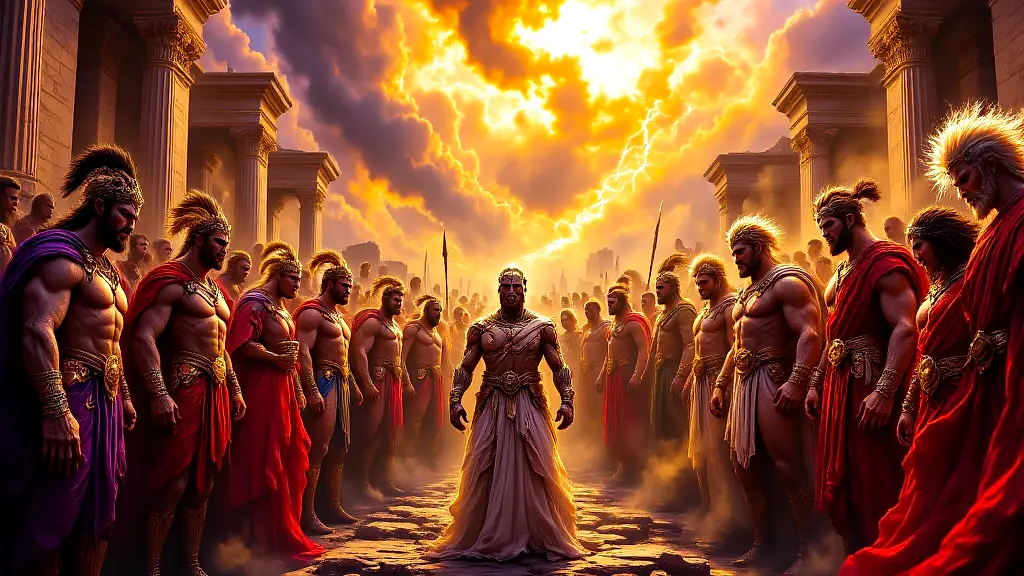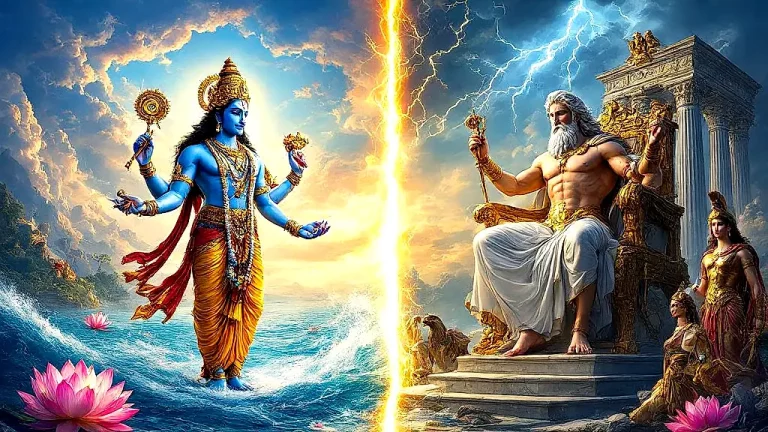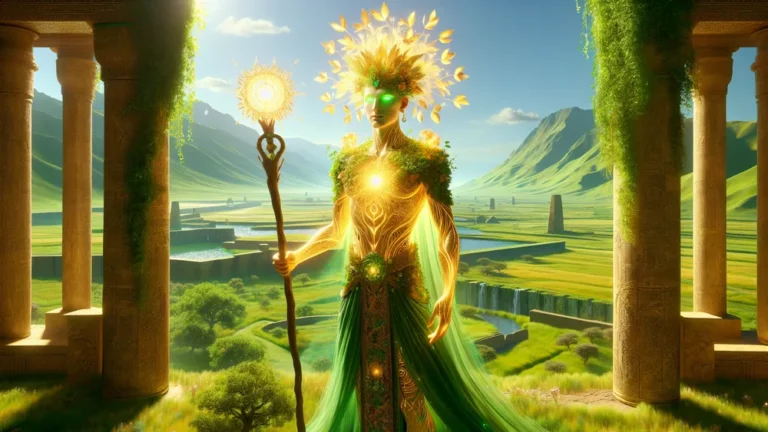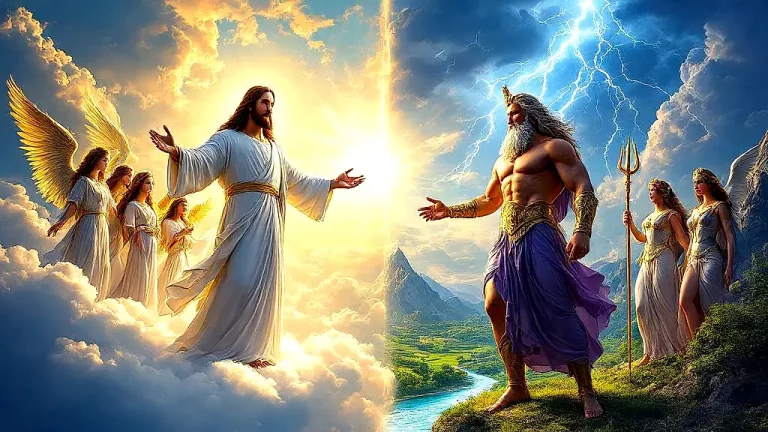197 Strong Greek Mythological Male Names For Your Hero
Greek mythology is more than just stories. The names in it hold deep meaning and history. Think of naming a hero after Zeus, who ruled like a storm. Or Heracles, known for his strength. Odysseus was clever, like a fox. These names have meaning because they come from myths where gods fought Titans, heroes faced monsters, and mortals tricked fate.
Key Points:
- Zeus leads the Olympian gods, known for his lightning and as king of the sky.
- Heracles did twelve tough tasks, proving his strength and earning a spot among the gods.
- The Titans, like Cronus, ruled before the Olympians but lost in a big war called the Titanomachy.
- Hades runs the Underworld, a place for the dead with areas like Elysium for heroes and Tartarus for the wicked.
- Odysseus stands out for his clever plans, like the Trojan Horse trick during the war.
- Lesser-known figures, such as Proteus who changes shape, add depth to Greek myths.
- Names like Achilles and Perseus carry meanings tied to their legendary deeds and traits.
If you’re writing a book or want a powerful name, this guide covers 197 male names from myth. They’re grouped by their roles – Olympian gods, Titans, heroes like Achilles, and underworld rulers like Hades. You’ll also find lesser-known figures, such as Proteus, the sea god who changed shape. Each name has a story. Some come from Zeus defeating Cronus. Others, like Orpheus, are tied to tragic love.
Want a name that stands the test of time? Let’s get started.
Greek Mythological Male Names: Overview and Key Facts
| Category | Key Figures (Examples) | What They Represent | Famous Stories | Name Meaning and Notes |
|---|---|---|---|---|
| Olympian Gods | Zeus, Apollo, Ares | Sky, Sun, War | Zeus fought the Titans in the Titanomachy. Apollo had an oracle at Delphi. | Zeus means “shining,” from the ancient word Dyeus. |
| Titans | Cronus, Hyperion, Atlas | Time, Light, Cosmic Order | Cronus devoured his children, fearing they would overthrow him. Atlas was forced to hold up the sky. | Atlas means “enduring” in Greek (Ἄτλας). |
| Legendary Warriors | Heracles, Perseus, Achilles | Strength, Cunning, Invincibility | Heracles completed the 12 Labors. Achilles was vulnerable only in his heel. | Heracles means “glory of Hera,” which is ironic. |
| Underworld Figures | Hades, Thanatos, Charon | Death, Passage to the Afterlife | Orpheus entered the Underworld to rescue his love. Sisyphus was punished with endless labor. | Thanatos is the literal personification of death. |
| Primordial Gods | Chaos, Gaia, Uranus | The Void, Earth, Sky | Gaia was the mother of the Titans. Cronus castrated Uranus. | Chaos means “gap,” referring to the first void. |
| Lesser-Known Figures | Proteus, Morpheus, Pan | Shapeshifting, Dreams, Wilderness | Proteus avoided capture by changing forms. Pan competed in musical contests. | Morpheus means “shaper,” as he formed dreams. |
Note: Some figures belong to multiple categories (Heracles became a god). Myths vary – Homer’s version of Achilles differs from later writers.
50 Powerful Olympian Gods and Goddesses
The Olympians were the main gods of ancient Greece. Zeus ruled over them all. They lived on Mount Olympus after defeating the Titans in a huge war called the Titanomachy. People worshipped them as representations of nature and human life. Here are 50 of the most important ones:
- Zeus – King of the gods. Controlled the sky and threw lightning bolts. He defeated his father Cronus to take power. Romans called him Jupiter.
- Poseidon – God of the sea and earthquakes. He made the first horses. Once competed with Athena to be the patron god of Athens. Roman name: Neptune.
- Hades – Ruled the Underworld and controlled precious metals. He kidnapped Persephone to be his wife. Almost never left his dark kingdom. Roman: Pluto.
- Hera – Goddess of marriage. Zeus’s wife who often punished his lovers. She made life hard for Heracles. Roman: Juno.
- Athena – Goddess of wisdom and war strategy. She sprang fully grown from Zeus’s head. Athens was her special city. Roman: Minerva.
- Apollo – God of the sun, music and prophecy. Artemis was his twin sister. People came to his oracle at Delphi for advice. Roman: Apollo.
- Artemis – Goddess of hunting and the moon. She protected young girls and once changed a man into a stag for spying on her. Roman: Diana.
- Ares – God of brutal war. Most Greeks disliked him, though Aphrodite loved him. Roman: Mars.
- Aphrodite – Goddess of love and beauty. She emerged from sea foam. Her actions helped start the Trojan War. Roman: Venus.
- Hephaestus – God of fire and metalworking. He made weapons for the gods and married Aphrodite, though she wasn’t faithful. Roman: Vulcan.
30 Titans and Primordial Gods
Before Zeus and the Olympians took over, the Titans ruled the universe. They were born when Gaia (Earth) and Uranus (Sky) came together. Even older were the primordial gods – they represented the basic forces that created everything, from empty nothingness to the steady march of time. Here are the 30 most important ones:
- Chaos – The endless nothing that existed before everything else
- Gaia – The living Earth itself. She gave birth to both Titans and Olympians
- Uranus – The sky god who covered Gaia. His son Cronus cut off his genitals
- Tartarus – The terrifying god of the underworld’s bottomless pit. This was where the worst punishments happened
- Eros – The original force of creation and new life (different from the later Cupid)
- Nyx – Night itself, who gave birth to many abstract gods
- Erebus – Endless darkness. He and Nyx created light and day
- Aether – The pure air gods breathed, filling the upper sky
- Hemera – The daytime, born to chase away her mother Nyx’s darkness
- Pontus – The ancient sea. Gaia created him without any father
- Ourea – The spirits of mountains, born directly from Gaia
- Cronus – The Titan who controlled time. He overthrew his father Uranus
- Rhea – Goddess of motherhood. She saved Zeus from being eaten
- Oceanus – The Titan of the enormous river encircling the world
- Tethys – Fresh water goddess who married Oceanus
- Hyperion – The light Titan. His children became the sun, moon and dawn
- Theia – Goddess of clear sight. She birthed the glowing celestial bodies
- Coeus – Titan of deep thinking. His daughters included Leto
- Phoebe – The prophetic Titaness. People connected her to the moon
- Mnemosyne – Memory itself. Zeus fathered the Muses with her
- Themis – Divine justice and natural order took shape through her
- Crius – This Titan ruled the star patterns in the night sky
- Iapetus – His children dealt with human mortality and suffering
- Atlas – Zeus punished him to hold up the sky for eternity
- Prometheus – Created humans and stole fire for them
- Epimetheus – Known for thinking too late. Married Pandora
- Menoetius – Zeus struck him down for his violent rage
- Asteria – Goddess of shooting stars and night prophecies
- Leto – Mother of Apollo and Artemis by Zeus
- Dione – Some stories say she was Aphrodite’s mother
Note: Different ancient writers disagreed about some details. For example, some called Dione an Oceanid instead of a Titan. The exact list changes depending on the source.
40 Great Heroes and Legendary Fighters
Greek heroes weren’t quite gods but more than human. Most were born when gods had children with mortals. Their stories taught important lessons about bravery, cleverness, and sometimes what not to do. Here are 40 of the most famous ones:
- Perseus – He was Zeus’s son. His most famous deed was killing Medusa by cutting off her head. Later he established the city of Mycenae.
- Heracles – Zeus’s strongest son. He completed twelve impossible tasks to atone for a crime. After he died, the gods made him immortal.
- Theseus – United the region around Athens. Found his way through the Labyrinth to kill the Minotaur. Became Athens’s legendary king.
- Achilles – The best fighter at Troy. His mother made him invulnerable except for one heel. He died when an arrow hit that spot.
- Odysseus – The cleverest Greek leader. Thought up the Trojan Horse trick. Took ten difficult years to return home after the war.
- Jason – Gathered Greece’s best adventurers to sail for the Golden Fleece. His wife Medea helped him succeed but later brought him tragedy.
- Bellerophon – Managed to tame the winged horse Pegasus. Used it to fly up and kill the fire-breathing Chimera.
- Atalanta – Could run faster than any man. Joined the dangerous hunt for the Calydonian Boar.
- Meleager – Led the Calydonian Boar hunt. His life depended on a burning log his mother kept safe.
- Orpheus – His music could charm anyone. Went to the Underworld to bring back his wife Eurydice but failed at the last moment.
- Cadmus – Founded the great city of Thebes. First had to kill a dragon that belonged to Ares.
- Pelops – Won a deadly chariot race to marry Hippodamia. The southern Greek peninsula bears his name.
- Amphitryon – Raised Heracles as his own son. Led Thebes’s armies before Heracles grew up.
- Castor – The mortal half of famous twins. Excelled at horseback riding and boxing.
- Pollux – The immortal twin. Shared his eternal life with his brother Castor after his death.
- Aeneas – A Trojan prince who survived the war. According to Romans, his descendants founded Rome.
- Hector – Troy’s greatest fighter. Killed Patroclus which made Achilles rejoin the battle.
- Ajax the Great – Second only to Achilles in strength. Went mad after not receiving Achilles’s armor.
- Ajax the Lesser – A skilled fighter who committed sacrilege by raping Cassandra in Athena’s temple.
- Diomedes – Fought so fiercely he wounded the war god Ares and love goddess Aphrodite.
30 Mythical Kings and Princes
These legendary rulers connected the gods’ plans with human rule. They founded cities, led armies, and often got caught up in divine conflicts. Their stories showed what Greek culture admired, and how power could destroy people. Here are 30 of the most important ones:
- Minos – The famous king of Crete. As Zeus’s son, he ruled when Minoan culture reached its peak.
- Aegeus – An early king of Athens. His son Theseus would become their greatest hero. The Aegean Sea got its name from him.
- Pandion – Ruled Athens during a period of war with Thebes.
- Erechtheus – Helped establish Athens. People worshipped him alongside Athena in the Parthenon.
- Cecrops – Athens’s first king had a human upper body and a snake’s tail.
- Theseus – United all of Attica under Athens. Best known for killing the Minotaur.
- Codrus – Athens’s last mythical king. Chose to die in battle when an oracle said this would save the city.
- Agamemnon – Commanded all Greek forces at Troy. Ruled Mycenae until his wife murdered him.
- Menelaus – King of Sparta married to Helen. The Trojan War started when she left him.
- Tyndareus – Helen’s stepfather. Made all her suitors swear to protect her chosen husband.
- Oedipus – Solved the Sphinx’s riddle to become Thebes’s king. Later discovered he had killed his father.
- Laius – Oedipus’s father. Pelops cursed him after he kidnapped a young prince.
- Cadmus – Founded Thebes after killing a sacred dragon.
- Amphion – Co-ruled Thebes. His music made stones move to build the city walls.
- Zethus – Amphion’s twin brother. Focused on practical matters while his brother used magic.
- Creon – Took over Thebes after Oedipus fell. His strict decisions led to more tragedies.
- Pentheus – Banned Dionysus’s worship. The god’s followers tore him apart.
- Labdacus – Oedipus’s grandfather. His bad decisions started the family curse.
- Pelops – Won his kingdom in a chariot race. The Peloponnese region bears his name.
- Atreus – Mycenae’s cruel king. Killed his nephews and served them to their father.
- Thyestes – Atreus’s brother. Their feud cursed the whole family.
- Perseus – Founded Mycenae after killing Medusa.
- Proetus – Ruled Tiryns while fighting with his twin brother for power.
- Acrisius – Perseus’s grandfather. An oracle said his grandson would kill him.
- Adrastus – Led the disastrous attack against Thebes with seven champions.
- Sisyphus – Corinth’s clever king. The gods punished him forever in the Underworld.
- Glaucus – Died when his own horses went mad and threw him.
- Lycaon – Zeus changed him into a wolf for testing the gods.
- Tantalus – Offended the gods by serving his son as food. Father of Pelops.
- Priam – Troy’s last king. Lost nearly all his sons in the Trojan War.
Note: These kings’ family trees twist together through marriages and wars. Many supposedly ruled for impossibly long times, showing they’re more legend than history.
27 Gods and Spirits of the Underworld
Hades and Persephone ran this complicated kingdom of the dead. It wasn’t just where people went after dying – heroes got special fields called Elysium, while the worst suffered in Tartarus. These underworld beings made sure the rules between life and death stayed in place. Here are 27 of the most important ones:
- Hades – The boss of the underworld. Also controlled hidden wealth, which earned him the name Plouton.
- Persephone – Queen of the dead for half the year. When above ground, she was Kore, the maiden of spring.
- Hecate – Goddess of magic crossroads. Had special powers in the underworld too.
- Thanatos – Represented the idea of dying gently and peacefully.
- Hypnos – God who made people sleep. Thanatos was his twin brother.
- Charon – The boatman. Charged coins to ferry souls across the Styx river.
- Cerberus – The massive three-headed dog. He made sure no dead souls escaped back to the living world.
- The Furies (Erinyes) – Three terrifying sisters. They punished people who hurt their own family members.
- The Judges:
-
- Aeacus – Judged dead Europeans. Carried the keys to Hades.
-
- Minos – Used to be king of Crete. Now decided where dead people would go.
-
- Rhadamanthus – Judged dead Asians. Ruled over the pleasant Elysium area.
-
- Lampades – Nymphs who carried torches for Hecate during nighttime rituals.
- Mormo – A boogeyman spirit. Scared children into behaving.
- Empusa – A monster that could change shape. Lured travelers to their doom.
- Keres – Dark spirits who collected dead warriors from battlefields.
- Lamia – A demon that ate children. Some stories say she was once a queen.
- Melinoe – Brought frightening dreams to people. Half her body was black, half white.
- Macaria – Hades’s daughter. Represented the idea of a good death.
- Acheron – The river of misery and sadness.
- Cocytus – Where souls wailed in the river of tears.
- Lethe – Drinking from this river made souls forget their past lives.
- Phlegethon – A boiling river of fire that punished some sinners.
- Styx – The most important river. Gods swore their most serious oaths by it.
- Tartarus – The deepest pit. The Titans were locked up here forever.
- Orphne – A nymph of the underworld. Mother of Hades’s gardener.
- Eurynomos – A flesh-eating demon. Painted blue in ancient artwork.
Note: Some underworld figures like Hecate also had roles above ground. Different Greek cults had their own versions – the Orphic mysteries added gods like Zagreus to this list.
20 Forgotten but Mighty Figures
Greek mythology has many powerful beings that most people never hear about. They come from older traditions before classical Greek culture, or had very specific jobs in the universe. These lesser-known figures show how varied Greek myths really were. Here are 20 that deserve more attention:
- Briareos – Had a hundred hands. Fought alongside Zeus when he battled the Titans.
- Anchiale – A Titan goddess. The dust she threw turned into the first Dactyls.
- Clytius – One of the giants. Hecate defeated him during the great war against the gods.
- Alcyoneus – The first giant born. Couldn’t be killed as long as he stayed on his homeland.
- Aegaeon – Another name for Briareos. Married Poseidon’s daughter.
- Dactyls – Magical metalworkers. Formed from the dust of Crete’s Mount Ida.
- Cercopes – Pranksters with ape-like features. Made the mistake of stealing from Heracles.
- Asterius – A giant most people forget. Athena killed him during the giant war.
- Damysus – The fastest giant. After his death, doctors used his bones to fix Pelops’ shoulder.
- Aix – A goat-like nymph. Zeus turned her skin into his famous aegis armor.
- Aegipan – Half-goat sea god. Helped Zeus when Typhon attacked Olympus.
- Olen – Considered the first poet. Created the original hymns sung at Delphi.
- Carme – A harvest goddess from Crete. Mother of the nymph Britomartis.
- Asterion – A river god few remember. Decided a dispute between Hera and Argos.
- Anytus – One of the Titans. Raised the goddess Despoina in secret Arcadian rituals.
- Eurymedon – King of the giants. His daughter Periboea married Poseidon.
- Alpos – A giant from Sicily. Had snake-like arms and legs.
- Sybaris – A female dragon. The hero Eurybatus killed her near Delphi.
- Lamius – Poseidon’s vampire son. Hunted children until Heracles stopped him.
- Ocnus – Punished in the afterlife. Forever weaves rope that a donkey eats.
Note: Many obscure figures like the Dactyls had their own local cults. Their stories often preserve elements from Minoan and Anatolian religions that existed before Greek culture.
Myths and Stories Behind the Names
Now we’ll examine the ancient tales that explain these names. These stories show why we still remember them today.
The Titanomachy: Titans vs. Gods
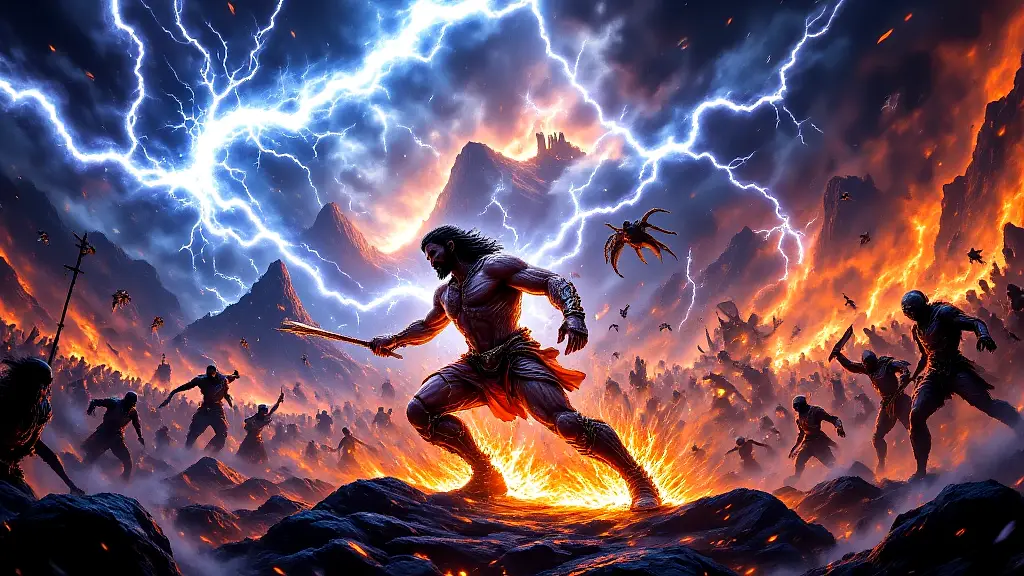
The Titanomachy was a ten-year cosmic war between two generations of gods. The older Titans, with Cronus leading them, fought against the younger Olympians commanded by Zeus. This was the ultimate generational conflict that decided who would rule the universe. According to Hesiod’s Theogony, the war began when Zeus freed his siblings from Cronus’ stomach. The paranoid Titan king had imprisoned them there.
Other traditions like the Orphic texts tell different versions of how it started. The battles were catastrophic. Combatants tore up mountains and threw them as weapons. The Cyclopes forged Zeus’ lightning bolts, which gave the Olympians a decisive advantage. To win, the Olympians recruited the hundred-handed Hecatoncheires and the Cyclopes for their strength and skills.
The Titans operated from Mount Othrys while the Olympians rallied at Mount Olympus. These opposing bases symbolized the conflict’s scale. After their victory, Zeus imprisoned most Titans in Tartarus. Some, like Themis and Prometheus, had joined the Olympians during the war. When the conflict ended, it changed Greek cosmology permanently. The Olympians divided control of the world: Zeus took the sky, Poseidon the seas, and Hades the underworld.
This transition explained to ancient Greeks how their universe became organized. Though the Olympians won, certain Titans continued influencing the world. Mnemosyne governed Memory while Hyperion controlled Light. The war established Zeus as supreme ruler but showed the complexity of divine politics.
| Titans (Old Order) | Olympians (New Order) | Key Differences |
|---|---|---|
| Cronus (Time) | Zeus (Sky) | Absolute rule vs. shared governance |
| Oceanus (Water) | Poseidon (Sea) | Primordial waters vs. controlled seas |
| Hyperion (Light) | Apollo (Sun) | Natural phenomena vs. personalized gods |
| Themis (Order) | Dike (Justice) | Cosmic law vs. human morality |
| Mnemosyne (Memory) | Athena (Wisdom) | Raw mental faculties vs. applied knowledge |
Note: Some Titans like Prometheus and Themis aided the Olympians, showing the complexity of these divine allegiances.
The ten-year war between the older Titans and younger Olympians ended with Zeus winning and splitting control of the world with his brothers, changing how the universe was ruled forever.
Heracles’ Twelve Labors: A Hero’s Journey
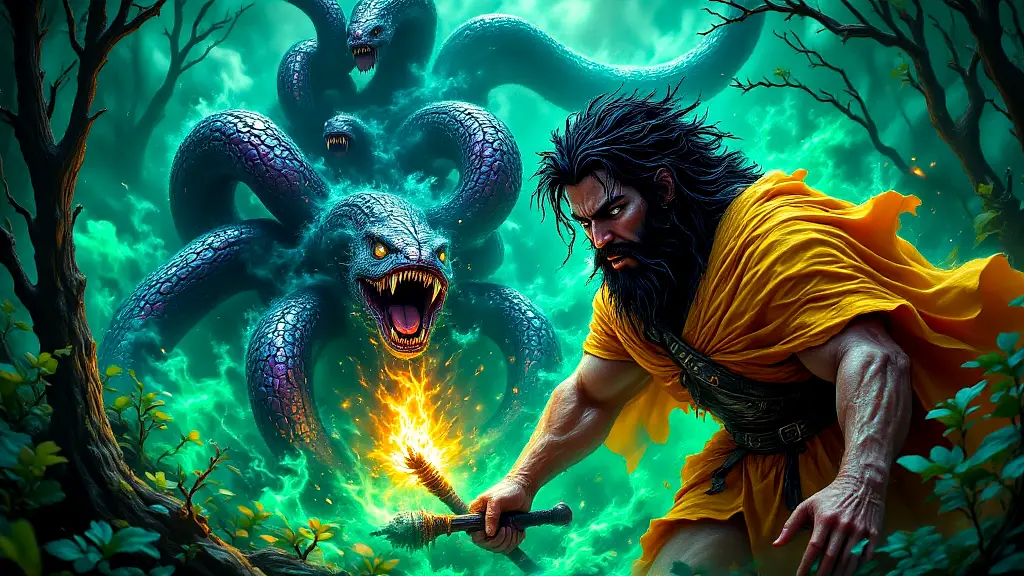
Heracles’ famous labors began as punishment for killing his family during madness that Hera caused. The Delphic oracle ordered him to serve King Eurystheus for twelve years. His tasks were impossible challenges no ordinary man could complete. What began as punishment became his ultimate redemption. It transformed Alcides (his original name) into Heracles, which means “Glory of Hera.”
This ironically honored his greatest enemy. Ancient sources disagree whether there were initially ten labors, with two added later over technical disputes. These labors progressed in difficulty. Early ones involved defeating deadly creatures like the Nemean Lion and Lernaean Hydra. Later tasks required capturing mythical beasts such as the Ceryneian Hind. The final labors took him to the underworld itself.
The reason some labors seem geographically impossible is that ancient Greeks believed Heracles journeyed to distant lands. He traveled to the far west for Geryon’s cattle and the world’s edge for the Hesperides‘ apples. The Hydra labor showed the challenges he faced – when he cut off one head, two grew back. His nephew Iolaus had to burn the stumps.
Ultimately, these tasks created a lasting influence on Greek culture. Each labor demonstrated different heroic qualities:
- Nemean Lion – Strangled and skinned the invulnerable beast
- Lernaean Hydra – Defeated the multi-headed regenerating serpent
- Ceryneian Hind – Captured Artemis’ sacred golden-horned deer
- Erymanthian Boar – Subdued the giant boar alive
- Augean Stables – Cleansed in one day (considered controversial)
- Stymphalian Birds – Destroyed the man-eating bronze-feathered birds
- Cretan Bull – Retrieved the Minotaur’s father from Crete
- Mares of Diomedes – Overcame the flesh-eating horses
- Belt of Hippolyta – Obtained the Amazon queen’s girdle
- Cattle of Geryon – Stole the three-bodied giant’s herd
- Apples of Hesperides – Secured the golden apples from Atlas’ garden
- Cerberus – Brought the underworld hound to the surface
Note: Some versions consider the Hydra and Augean stables as invalid labors due to assistance received, requiring two additional tasks.
Hades’ Realm: Myths of the Underworld
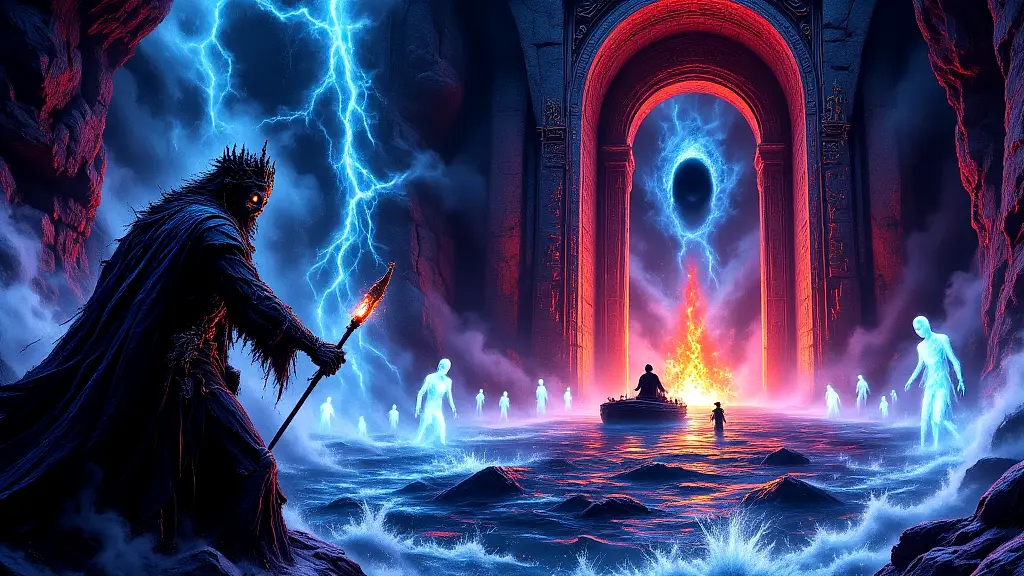
The Greek Underworld was a dark realm divided into distinct regions. Five rivers marked its entrance, including the renowned Styx where Charon transported souls. He required an obol coin for passage. Beyond lay the Fields of Asphodel for ordinary souls, Elysium for heroes, and Tartarus for the condemned. Contrary to common belief, most souls inhabited Asphodel Meadows. This was an intermediate area rather than a place of punishment.
Homer describes it as a misty, dreary place in early accounts. Later poets developed more complex divisions that reflected Greek concepts of justice.
Several deities and creatures governed this cosmic order with specific duties:
- Hades and Persephone: The divine rulers who administered the realm
- Charon: The ferryman who required an obol coin
- Cerberus: The three-headed hound that prevented escapes
- Judges (Minos, Rhadamanthus, Aeacus): They determined where souls belonged
- Furies: These beings punished oath-breakers specifically
- Thanatos: He personified gentle death
The Underworld contained several notable features:
- The Styx (waters that bound oaths)
- Lethe (river that caused forgetfulness)
- Tartarus (deep abyss for Titans and grave sinners)
- Erebus (primordial darkness)
- The Mourning Fields (for those who wasted love)
Note: Mystery cults like the Eleusinians taught that initiates could attain better afterlife conditions, demonstrating how these beliefs developed over time.
Odysseus’ Cunning and the Trojan War
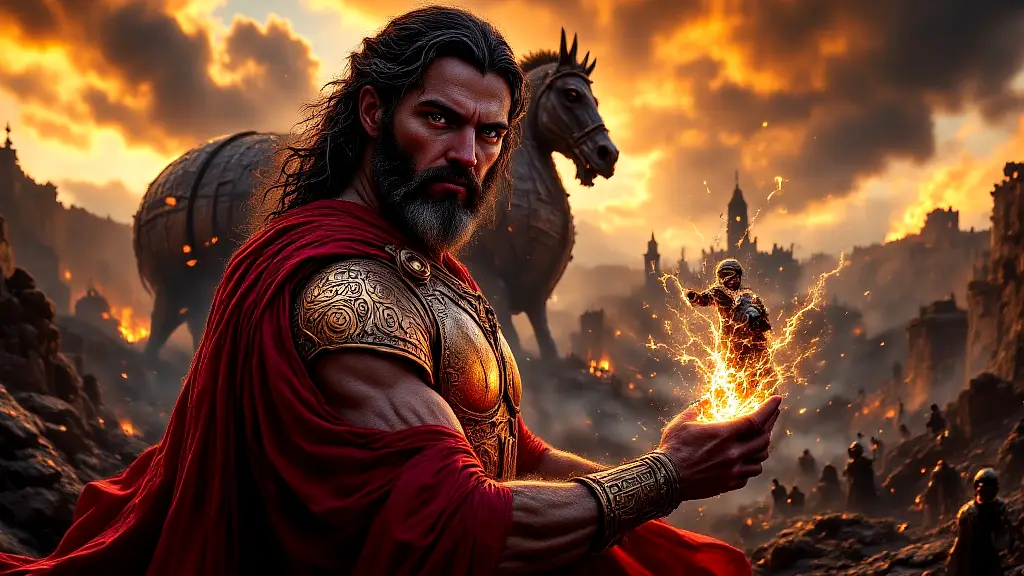
Odysseus established his reputation as Greece’s most resourceful strategist early in the Trojan War. Homer’s Iliad records how he convinced Achilles to join the conflict when he disguised himself as a peddler. He orchestrated the controversial sacrifice of Iphigenia and created the Oath of Tyndareus, which forced all of Helen’s suitors to defend her chosen husband.
His intelligence demonstrated strategic foresight that went beyond mere tricks. It embodied the Greek ideal of metis – a blend of practical wisdom, adaptability, and persuasive speech that even deities respected. Athena, the wisdom goddess, became his protector because she valued these qualities.
In addition to the Trojan Horse (which some Roman sources credit to Epeius), Odysseus executed multiple ingenious operations during the war. He entered Troy disguised as a beggar to collect information and stole the Palladium, the city’s protective statue. Earlier, he had pretended madness to avoid military service until they tested him with his infant son. The Trojan Horse operation required both discipline and strategic planning.
Odysseus left Sinon behind to deceive the Trojans while warriors waited silently inside. Less known is how he thwarted Palamedes’ attempt to make the Greek army leave prematurely, proving his ability to detect deception. Odysseus’s strategies produced complicated outcomes. While they helped Greece win the war, his trick of blinding Polyphemus earned Poseidon’s lasting enmity. This hostility led to his famous wanderings.
His shrewd nature made others both admire and distrust him – when he finally reached Ithaca, he had to repeatedly verify his identity. Later traditions suggest his cleverness ultimately backfired. One account states his son Telegonus killed him accidentally, completing a pattern of mistaken identities. The Trojan War served merely as the opening act in Odysseus’s lifelong demonstration of how intelligence could both protect and endanger its possessor.
FAQs
1. What Greek male name symbolizes invincibility?
The Greek male name that symbolizes invincibility is Achilles, famed for his near-complete invulnerability in myth.
2. Are these names historically accurate for ancient Greece?
These names are historically accurate for ancient Greece, sourced from verified texts like Homer’s epics and Hesiod’s Theogony.
3. Which name represents strategic wisdom?
The name that represents strategic wisdom is Odysseus, famed for his cunning in the Trojan War.
4. Can these names be used in modern contexts?
These names can be used in modern contexts, appearing in literature, astronomy, and popular culture as timeless symbols of power and wisdom.

